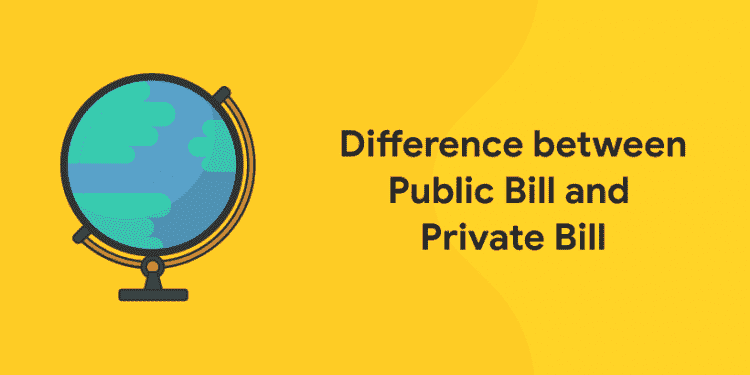A bill is the draft of a legislative proposal, when it is passed by both houses of Parliament and assented to by the President, becomes an Act of Parliament. All legislative proposals are brought before Parliament in the forms of Bills. The bill can then be amended to incorporate the public opinion in a constructive manner and then may be introduced in the Parliament by ministers or private members.
Difference between Public Bill and Private Bill
Bills can be classified as public bills and private bills. A public bill is one referring to a matter applying to the public in general, whereas a private bill relates to a particular person or corporation or institution. A bill introduced in Lok Sabha pending for its approval, lapses when the Lok Sabha is dissolved. Bills can also be broadly classified into Government Bills and Private Members’ Bills depending upon their initiation in the House by a Minister or a Private Member.
Public bills are initiated by a Minister, so that they are referred to as “government bills”. And if the bills are initiated by private Members, in that case they are called “private Members’ bills”. While public bills deal with questions of national interest, and the purpose of private bills is to grant powers, special rights or exemptions to a person or persons, including corporations.
Public Bills
A public bill or the government bill is formulated as a result of a legislative initiative that the government submits to Parliament to be approved, and possibly amended, before becoming law. And those bills relate to a matter of public interest and may include financial provisions.
Download Entri app for free and attempt GK mock tests
Private Members’ Bills
A Private Member’s bill is the text of a legislative initiative that is submitted to Parliament by a Member who is not a Minister to be approved, and possibly amended, before becoming law. Most of the private member’s bills, originate in the Parliament, but some of them are sent to Parliament by the Senate. Before this kind of bill can be taken up for debate by the House, it must have been selected following a random draw, as provided by the Standing Orders.
The purpose of a private bill is to excuse a person or group of persons, including a corporate person, from the application of a statute (regulation). The bills are not introduced by a Minister, and must be founded on a petition signed by the persons who are interested in promoting it. The distinction between a public bill and a private bill is primarily a function of the purpose of the bill. Most of the private bills are introduced in the Senate, but they may also be introduced in the Parliament, although this is a rarer occurrence. Private bills before the House are dealt with as Private Members’ Business, since they are moved by Members who do not hold ministerial office. Although private bills must go through the same stages as any other legislative measure, there are other stages that must be completed before they are introduced.
Read article on Types of Constitution
Distinctions between Public and Private bills
| Public Bill | Private Bill |
| 1. It is introduced in the parliament by a minister. | 1. It can be introduced by any member of the parliament other than a minister. |
| 2. It reflects the policies of the government (ruling party). | 2. It reflects the mood of the political party on the public matter. |
| 3. It has greater chance to be passed by the parliament. | 3. It is less likely to be passed by the parliament. |
| 4. Its rejection in the lower house of the parliament may lead to the resignation of the while cabinet. | 4. Its rejection by the house has no implication on the parliamentary confidence of the ruling party. |
| 5. It’s introduction in the house requires 7 days notice. | 5. Its introduction in the house requires one month’s. |
| 6. It is drafted by the concerned department in consultation with the law department. | 6. Its drafting is the responsibility of the members concerned. |
Learn with Entri and get updated to Current Affiars
We can classify the bills according to the each purpose, which are introduced in the parliament. They can be: Ordinary bills, Money bills, financial bills and Constitution amendment bills.
- Ordinary bills are concerned with any matter other than financial subjects.
- Money bills are concerned with the financial matters like taxation, public expenditure etc.
- Financial bills are also concerned with financial matters (but are different from money bills).
- Constitution amendment bills are concerned with the amendment of the provisions of the Constitution.
Indian Constitution is a major topic in most of the competitive examinations. Even though understanding the procedures and functions of Parliament and its bodies are the basic general knowledge part of a citizen.













